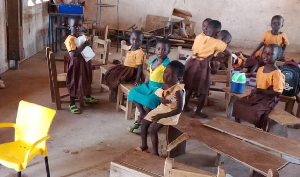 Some children have had to learn under distressing conditions.
Some children have had to learn under distressing conditions.
Poor infrastructure coupled with inadequate teaching and learning materials in most basic schools in the Upper East Region is adversely affecting early childhood education and development.
Pupils in many basic schools in the region, particularly at nursery and kindergarten levels are learning in dilapidated structures, which can be described as ‘death-traps,’ while others are learning under trees, posing significant health and further danger to the toddlers.
The Upper East Regional Early Childhood Development Committee, which revealed these at the 2024 third quarter meeting in Bolgatanga, noted that many of the schools it visited, had deep cracks in their walls and floors.
The Committee said situation was not only affecting teaching and learning in these schools, but also contributing to a decline in enrolment of pupils.
Some of the schools had leaking roofs, broken doors and windows, with the pupils lying on their stomachs to learn due to lack of furniture, exposing the children to pneumonia and other cold related conditions.
They added that apart from the lack of decent learning environment, the schools did not have Water, Sanitation and Hygiene (WASH) facilities, compelling the pupils to defecate and urinate in the open.
The meeting was organised by the Upper East Regional Coordinating Council with funding support from the Children Believe, a child focused Non- Governmental Organisation (NGO).
The Committee is made up of stakeholders drawn from the Upper East Regional Coordinating Council, Departments of Gender, Children and Social Welfare, Ghana Education Service, Ghana Health Service, Environment and Sanitation Unit, civil society organisations.
Mrs Georgina Aberese-Ako, a member of the Committee and Acting Regional Director of the Department of Children, presenting a report on a field visit undertaken by the Committee within the quarter under review, said many schools had bad structures, and the situation was affecting academic work.
She cited for instance, the Pelungu basic school in the Nabdam District, where there were a total of 40 pupils in kindergarten one and 46 pupils in kindergarten two, who had to learn under such distressed conditions.
The school’s structure was in a very bad state, with cracks on the walls and floors while the doors and windows were broken and the pupils sat on plastic mats provided by their parents to learn due to lack of furniture.
“The school did not also have adequate teaching and learning materials and the toilet facility is not also age appropriate. This is very worrying, and we must work together to address these challenges to promote childhood development,” she said.
The report indicated that the Yakote primary school, also in the Nabdam District, was in a similar state, bad state of classrooms and toilet facility, however, the pupils had furniture to sit on due to the generosity of a philanthropist.
Mr John Nyaaba, the Upper East Regional Early Childhood Development Coordinator of the Ghana Education Service, acknowledged the challenges of poor infrastructure and human resource challenges at the basic school level especially for the kindergarten, stating that most of the schools did not have early childhood centres.
He said it was also noticed that apart from the poor state of school buildings which cut across all the 15 districts in the region, some schools rather used the classrooms constructed for the kindergarten pupils, for upper primary levels, leaving the toddlers to their fate.
“Some school head teachers use the KG classrooms for the upper primary and send the KG children to study under trees, with the view that they are only there to play. Apart from that, early childhood education teachers were posted from the head office, while others also refuse postings to some schools which needs to be looked at,” he added.
Mrs Yvonne Wonchua, the Assistant Director, Upper East Regional Coordinating Council, said the region was already deprived and reiterated the need for the Committee, to continue to work with relevant stakeholders to address the challenges in education to promote early childhood development in the region.